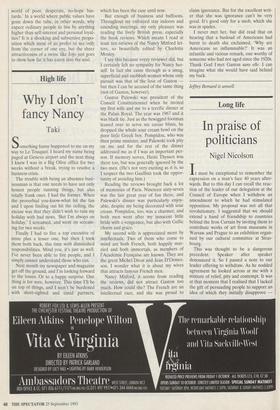High life
Why I don't fancy Nancy
Taki
Something funny happened to me on my way to Le Touquet. I heard my name being paged at Geneva airport and the next thing I knew I was in a Big Olive office for two weeks without a break, trying to resolve a business crisis.
The trouble with being an absentee busi- nessman is that one needs to have not only honest people running things, but also totally frank ones. I had the former. When the proverbial you-know-what hit the fan and I upon finding out hit the ceiling, the excuse was that they didn't wish to ruin my holiday with bad news. 'But I'm always on holiday,' I screamed, and went on scream- ing for two weeks.
Finally I had to fire a top executive of mine plus a lesser one, but then I took them both back, this time with diminished responsibilities. Mind you, it's just as well. I've never been able to fire people, and I simply cannot understand those who can.
Next month my newspaper and magazine get off the ground, and I'm looking forward to the losses. Or to a happy surprise. One thing is for sure, however. This time I'll be on top of things, and I won't be burdened with short-sighted and timid partners, which has been the case until now.
But enough of business and buffoons. Throughout my enforced stay indoors and unending meetings, my only pleasure was reading the lively British press, especially the book reviews. Which means I read at least ten reviews of the Nancy Mitford let- ters, so beautifully edited by Charlotte Mosley.
I say this because every reviewer did, but I certainly felt no sympathy for Nancy her- self. In fact she came through as a smug, superficial and snobbish woman whose only pursuit was that of the love of Gaston — but then I can be accused of the same thing (not of Gaston, however).
Gaston Palewski was president of the Conseil Constitutionnel when he invited my first wife and me to a terrific dinner at the Palais Royal. The year was 1967 and it was black tie. Just as the bewigged footman leaned over to serve me caviar blinis, he dropped the whole sour cream bowl on the poor little Greek boy. Pompidou, who was then prime minister, and Palewski took pity on me and for the rest of the dinner addressed me as if I was an important per- son. If memory serves, Heini Thyssen was there too, but was generally ignored by the two men. (He's not very exciting as it is, so I suspect the two Gaullists took the oppor- tunity of avoiding him.)
Reading the reviews brought back a lot of memories of Paris. Nineteen sixty-seven was the last great year of fun there, and Palewski's dinner was particularly enjoy- able, despite my being decorated with sour cream. Pompidou, too, was a charmer, and both men went after my innocent little bride with a vengeance, but also with Gallic charm and grace.
My second wife is appreciated more by intellectuals. Two of them who come to mind are both French, both happily mar- ried and both immortals, as members of l'Academie Francaise are known. They are the great Michel Deon and Jean D'Ormes- son. I wonder what it is about my wives that attracts famous French men.
Nancy Mitford, it seems from reading the reviews, did not attract Gaston too much. How could she? The French are an intellectual race, and she was proud to claim ignorance. But for the excellent writ- er that she was ignorance can't be very good. It's good only for a snob, which she was in spades.
I never met her, but did read that on hearing that a busload of Americans had burnt to death she exclaimed, 'Why are Americans so inflammable?' It was an infantile and vicious remark, one worthy of someone who had not aged since the 1920s. Thank God I met Gaston sans elle. I can imagine what she would have said behind my back.
Jeffrey Bernard is unwell.


























































 Previous page
Previous page